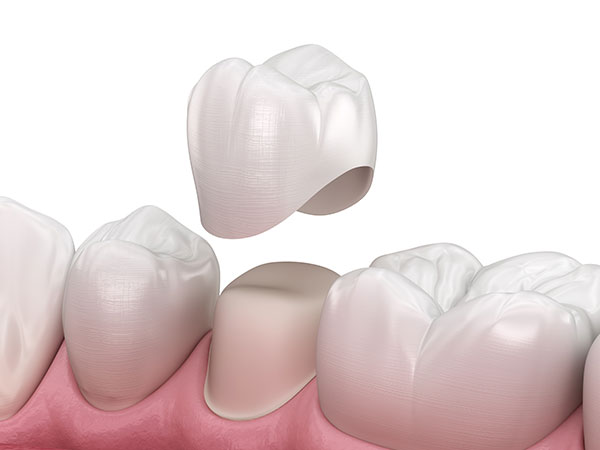Metal Dental Crowns in Knoxville, TN
Please note we may not offer this service at our office. Call (865) 687-8670 for more information.
Discover How a Metal Dental Crown Can Restore Your Tooth
When considering dental crowns, there are several options available. One of the most prevalent materials used is metal. Metal-based dental crowns have been a staple in dentistry for decades, making them a popular choice among patients.
To learn more about metal dental crowns, reach out to our dentist in Knoxville, TN, by calling (865) 687-8670 today.

What Are Metal Dental Crowns?
Metal dental crowns have been a trusted choice for many patients over the years. Renowned for their strength and durability, these crowns are particularly favored for use on back teeth. A metal crown is designed to resist wear and tear and can endure substantial pressure.
What Type of Material is Used for a Metal Dental Crown?
There are several types of metal dental crowns available, including:
- Gold crowns: Crafted from a gold alloy, these crowns are highly biocompatible and resistant to corrosion.
- Silver crowns: Composed of silver, tin, and other metals, they are durable and cost-effective, although they may discolor over time.
- Platinum crowns: Made from a platinum alloy, these are strong, durable, and corrosion-resistant, albeit more costly than other metal crowns.
- Palladium crowns: Crafted from a mix of palladium, gold, and other metals, they are suitable for patients with metal allergies.
- Base metal alloy crowns: Consisting of non-noble metals like nickel, chromium, and titanium, these crowns are robust, durable, and affordable, though they may cause allergic reactions in some individuals.
Benefits of a Metal Crown
Several benefits can be gained by receiving a metal crown, including:
- Strength and Durability: These crowns are incredibly robust and can endure substantial pressure, making them ideal for molars.
- Longevity: With proper care and maintenance, metal crowns can last for many years, often exceeding 20 years.
- Preservation of Natural Tooth Structure: They require minimal removal of the natural tooth structure compared to other crown types like porcelain or ceramic.
- Resistance to Wear and Tear: Metal crowns are less prone to chipping or breaking compared to other crown varieties.
- Biocompatibility: Many metals used in dental crowns, such as gold and palladium, are highly biocompatible and unlikely to trigger allergic reactions.
Metal Crown Drawbacks
While metal crowns offer many benefits, there are some potential drawbacks to consider:
- Appearance: Metal crowns are not tooth-colored, making them more conspicuous than other crown types, especially when used on front teeth.
- Heat Conductivity: These crowns can conduct heat and cold, which might lead to discomfort for some patients.
- Wear on Opposing Teeth: Due to their hardness, metal crowns may cause increased wear on opposing teeth compared to other crown varieties.
- Cost: Depending on the alloy used, metal crowns can be pricier than other crown types.
- Allergies: Although uncommon, some patients may experience allergic reactions to certain metals in dental crowns, leading to inflammation and other health concerns.
The Metal Dental Crown Process
Preparation and Impressions
The initial step in obtaining a metal crown involves preparing the tooth. Your dentist will eliminate any decay or damage and shape the tooth to accommodate the crown. If the remaining tooth structure is insufficient, they may need to build it up to support the crown.
After preparing the tooth, your dentist will take impressions of both the tooth and the surrounding teeth. These impressions are sent to a dental lab, where a custom crown is crafted to fit your tooth and bite precisely. Meanwhile, a temporary crown will be placed on the tooth to protect it until the permanent crown is ready.
Crown Placement
Once the permanent crown is completed, you’ll return to the dental office for the placement procedure. The temporary crown is removed, and the new crown is placed on the tooth to evaluate the fit and make any necessary adjustments.
Once the fit is ideal, your dentist will secure the crown in place using a dental adhesive. They will then check your bite to ensure the crown aligns correctly with the opposing teeth.
Follow-Up Care
After the crown is in place, we will provide instructions on how to care for it. Maintaining good oral hygiene, including regular brushing and flossing, is crucial to keeping the crown and surrounding teeth healthy.
Metal Crown Costs
The cost of metal crowns can fluctuate based on several factors, such as the location of the dental practice, the dentist’s level of experience and expertise, the complexity of the dental case, and any additional procedures that might be necessary. Typically, metal crowns are more cost-effective compared to other crown types due to the lower cost of materials and the straightforward nature of their fabrication process.
Generally, the price for a metal crown ranges from $800 to $1,500 per tooth. However, this is merely an estimate, and actual prices can vary widely. Additionally, dental insurance may influence the out-of-pocket costs for a metal crown, as some insurance plans may cover part of the expense.
Alternative Crown Options
Due to the potential for metal crowns to affect the aesthetic of a smile, many patients explore other crown alternatives:
- Porcelain-Fused-to-Metal (PFM) Crowns: These crowns feature a metal foundation with a porcelain overlay. The porcelain offers a more natural tooth-like appearance, while the metal ensures strength. However, the metal base may become visible if gum recession occurs.
- All-Porcelain or All-Ceramic Crowns: Entirely crafted from porcelain or ceramic, these crowns are celebrated for their superior aesthetic qualities. They mimic the translucence and color of natural teeth. Although not as robust as metal or PFM crowns, advancements in materials have enhanced their durability.
- Zirconia Crowns: Made from a highly durable ceramic material, zirconia crowns can be used alone or layered with porcelain for enhanced aesthetics. Their strength rivals that of metal, making them suitable for front and back teeth.
- Composite Resin Crowns: Constructed from a blend of plastic and glass, these crowns are a more budget-friendly option. They can be visually appealing but may wear down more quickly than other materials.
Frequently Asked Questions
Absolutely, metal crowns are generally deemed safe. They have been utilized for decades and boast a solid history of success. However, some individuals may have allergies to specific metals used in these crowns, so it’s essential to discuss any known allergies or concerns with your dentist.
With proper care and maintenance, metal crowns can endure for many years, often exceeding 20 years or more. The longevity of a dental crown is influenced by factors such as oral hygiene practices, dietary habits, and overall wear and tear.
While metal crowns are typically safe, they can interfere with certain medical procedures, including MRI (magnetic resonance imaging). The presence of metal can create artifacts on the MRI image, complicating the interpretation of results. If you have a metal dental crown, be sure to inform your healthcare provider before undergoing an MRI so they can take the necessary precautions.
Discover if Metal Crowns Meet Your Dental Needs
Metal crowns provide a robust and long-lasting solution for those addressing tooth decay or other dental issues. Consult with Dr. Niral Patel to explore your dental crown options and find the most suitable choice for your specific needs.
Contact our Knoxville dental office at (865) 687-8670 to book a consultation and start your path to a healthy, radiant smile. We’re proud to serve patients from Amherst, Marble City, and West Knoxville, TN.

